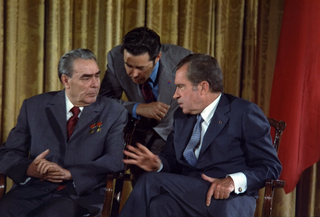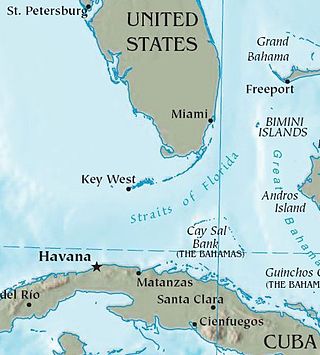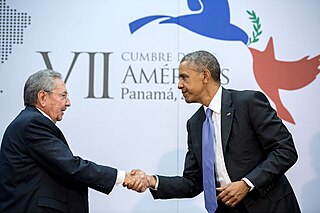Wayne S. Smith (born 1932 in Texas) is a former US diplomat, academic, and author. He published four books on the topic of Cuba and U.S.-Cuba relations.
In 1949, Smith joined the United States Marine Corps, and served until 1953, including combat in the 1950-1953 Korean War. In 1957, he joined the US State Department, serving in posts in Brazil, the Soviet Union, Argentina and Cuba. From 1979 to 1982, he was the second Chief of Mission of the US Interests Section in Havana under President Jimmy Carter and President Ronald Reagan. Smith retired after 25 years in the Foreign Service due to personal disagreement with the policies of Reagan in Latin America. In particular, he disagreed with the Reagan policies in Central America at the time (Iran Contra, military advisers in El Salvador and Nicaragua) and Cuba. He forcefully rejected the idea that diplomacy should take a back seat to the use of force and vehemently disagreed with the U.S. embargo on Cuba, believing it to be counter productive to the establishment of meaningful dialogue and rapprochement between the two countries.
At the time of his retirement in 1982, he became a fellow at the Carnegie Endowment for International Peace (1982-1984) and an adjunct professor at Johns Hopkins School of Advanced International Studies in Washington, D.C., where he established a Cuba program and taught until 1998. Smith consistently urged members of the U.S. Congress to end the embargo during those years. After the 1992 Helms-Burton legislation, signed into law by then-President Bill Clinton, Smith took it upon himself to launch targeted diplomatic missions headlining various politicians and groups of interest to Cuba to facilitate dialogue. He was the first intermediary to take Senator Patrick Leahy, among others, and various Congressional fact finding missions to Cuba. He also established a doctor interchange between the medical faculty at Johns Hopkins School of Medicine and medical doctors in Cuba to exchange ideas and research ideas and protocols. Smith also introduced a number of U.S. Associations to interested parties in Cuba, Rice Growers Association, Sugar Growers Association, among others. He facilitated the free exchange of information and the establishment of a mutually inclusive flow of information between the U.S. National Oceanic and Atmospheric Administration and Cuba's oceanographic and weather scientists to work jointly on hurricane science and warning systems, in addition to fisheries and information pertaining to the Jet Stream flowing between the two countries.
Smith was a key figure in establishing a legal and steady flow of air charter flights from Miami beginning in 1982 and expanding to encompass numerous airlines chartering Cubans living in Miami to Havana.
Smith worked with the Center for International Policy from 1995 to 2014.
He is one of the senior skeptics about the US embargo against Cuba. [1] He has been involved with the Center for International Policy. [2]

José Martí International Airport, sometimes known by its former name Rancho Boyeros Airport, is an international airport located 20 kilometres (12 mi) southwest of the centre of Havana, Cuba, and is a hub for Cubana de Aviación and Aerogaviota, and former Latin American hub for the Soviet airline Aeroflot. It is Cuba's main international airport, and serves several million passengers each year. The facility is operated by Empresa Cubana de Aeropuertos y Servicios Aeronáuticos (ECASA).

Détente is the relaxation of strained relations, especially political ones, through verbal communication. The diplomacy term originates from around 1912, when France and Germany tried unsuccessfully to reduce tensions.

The United States embargo against Cuba prevents US businesses, and businesses organized under US law or majority-owned by US citizens, from conducting trade with Cuban interests. It is the most enduring trade embargo in modern history. The US first imposed an embargo on the sale of arms to Cuba on March 14, 1958, during the Fulgencio Batista regime. Again on October 19, 1960, almost two years after the Cuban Revolution had led to the deposition of the Batista regime, the U.S. placed an embargo on exports to Cuba except for food and medicine after Cuba nationalized the US-owned Cuban oil refineries without compensation. On February 7, 1962, the embargo was extended to include almost all exports. The United Nations General Assembly has passed a resolution every year since 1992 demanding the end of the US economic embargo on Cuba, with the US and Israel being the only nations to consistently vote against the resolutions.

Roger Francisco Noriega is an American diplomat who served as Assistant Secretary of State for Western Hemisphere Affairs in the George W. Bush administration He is a visiting fellow at the American Enterprise Institute.

The Cuban exodus is the mass emigration of Cubans from the island of Cuba after the Cuban Revolution of 1959. Throughout the exodus, millions of Cubans from diverse social positions within Cuban society emigrated within various emigration waves, due to political repression and disillusionment with life in Cuba.

Ricardo Alarcón de Quesada was a Cuban politician. He served as his country's Permanent Representative to the United Nations (UN) for nearly 30 years and later served as Minister of Foreign Affairs from 1992 to 1993. Subsequently, Alarcón was President of the National Assembly of People's Power from 1993 to 2013, and because of this post, was considered the third-most powerful figure in Cuba. He was also until 2013 a Member of the Central Committee of the Communist Party of Cuba.
The Cuban–American lobby are various groups of Cuban exiles in the United States and their descendants who have historically influenced the United States' policy toward Cuba. In general usage, this refers to anti-Castro groups.

The United States Interests Section of the Embassy of Switzerland in Havana, Cuba represented United States interests in Cuba from September 1, 1977 to July 20, 2015. It was staffed by United States Foreign Service personnel and local staff employed by the US Department of State, and located in a multi-story office building on the Malecón across from the Plaza de la Revolución in Havana. The mission resumed its role as the Embassy of the United States in Cuba on July 20, 2015, following the normalization of diplomatic relations between the two countries.

Cuba and the United States restored diplomatic relations on July 20, 2015, after relations had been severed in 1961 during the Cold War. U.S. diplomatic representation in Cuba is handled by the United States Embassy in Havana, and there is a similar Cuban Embassy in Washington, D.C. The United States, however, continues to maintain its commercial, economic, and financial embargo, making it illegal for U.S. corporations to do business with Cuba.

The Cuban Democracy Act (CDA), also known as the Torricelli Act or the Torricelli-Graham Bill, was a bill introduced and sponsored by U.S. Congressman Robert Torricelli and aimed to tighten the U.S. embargo on Cuba. It reimplemented the ban of U.S. subsidiaries in other countries from trading with Cuba, hindered the ability for ships docked within Cuban ports to travel to U.S. ports, and worked to circumvent other aspects of the embargo to provide humanitarian aid to Cuba in an attempt to draw the Cuban people closer to the United States.
Cubana de Aviación S.A is Cuba's largest airline and flag carrier.
Dr. Bernardo Benes Baikowitz was a prominent Jewish Cuban lawyer, banker, journalist and civic leader, who was responsible for freeing 3,600 Cuban political prisoners in 1978.

The Canada–Cuba relations are the bilateral relations between Canada and Cuba. Informal trade relations between the colonies of Atlantic Canada and the Captaincy General of Cuba have existed since the 18th century. The informal trading relationship between Canada and Cuba continued into the 20th century, with diplomatic relations formally established between the two countries in 1945.
Alfredo Joaquin González Durán is a Cuban-born lawyer and an advocate for dialogue as a way to bring regime change in Cuba. His views are considered controversial in some parts of the Cuban exile community in Miami.
The North-South Center, later named The Dante B. Fascell North-South Center at the University of Miami in honor of former U.S. Congressman and House Foreign Affairs Committee chairman Dante Fascell, was an independent research and educational institution established in 1984 at the University of Miami in Coral Gables, Florida, United States. The North-South Center was closed by the university in December 2003.
United Nations Security Council Resolution 1725, adopted unanimously on December 6, 2006, after recalling previous resolutions on the situation in Somalia, particularly resolutions 733 (1992), 1356 (2001) and 1425 (2002), the Council authorised the Intergovernmental Authority on Development (IGAD) and African Union to establish a protection and training mission in the country.

The Cuban thaw was the normalization of Cuba–United States relations that began in December 2014 ending a 54-year stretch of hostility between the nations. In March 2016, Barack Obama became the first U.S. president to visit Cuba since Calvin Coolidge in 1928. The normalization of relations between the United States and Cuba was relatively short lived, with much of the diplomatic progress that was made later being undone by the Trump administration.
In 1978 negotiations known as El Diálogo occurred between Cuban exile groups and the Cuban government that resulted in the release of political prisoners.
Regan v. Wald, 468 U.S. 222 (1984), was a United States Supreme Court case in which the Court held by a 5–4 majority that restrictions upon travel to Cuba established as part of the Cuban Assets Control Regulations in 1963 did not violate the freedom to travel protected by the Due Process Clause of the Fifth Amendment.